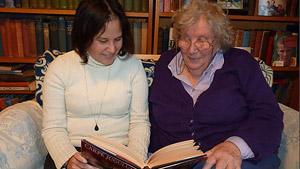I was recently asked to write a one-page essay answering the question, ‘What has changed since you were young?’ After a great deal of consideration, my essay consisted of one word: Everything. That is why I am so glad that I wrote down everything I could remember about Bletchley Park while my memory was still clear. Nothing like the Park can ever happen again. It is part of a vanished world, encapsulated in a glass, like one of those Christmas snow-globes. You give it a twist of memory and all is action; turn it back and all is still.
But it was not any such elevated motive as the accurate rendering of an important piece of past history that goaded me into actually beginning to write; no, it was a much baser impulse. I, and many former Bletchleyites, had been horrified by Robert Harris's novel Enigma, which professed to be an intensively researched account, but was actually a farrago of errors, inaccuracies and impossibilities. But as I wrote, I saw that the book was turning into an elegy for a lost time, and for places and friends I had loved.
There were very few rules at BP. The one Rule which overrode all others was Silence; silence about your own work except to others engaged in it; silence, preferably ignorance, about the work of others, and SILENCE about the Park itself. That would be impossible now; Twitter, Facebook, investigative journalism, would soon be on the track of anything secret. But the great silence was kept then; as far as I know, no single person ever broke it until, sometime in the 70s, the secret emerged. To have lived through a time when thousands of ordinary (and many very extraordinary people) were voluntarily keeping silence for their country's sake seems to me almost unbelievable, and a time to remember until the history of Britain is forgotten altogether.









